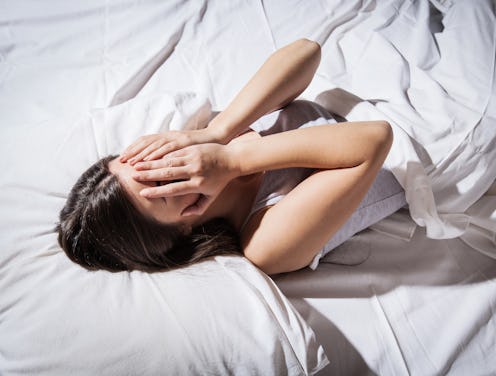Regardless of how much sleep I get, I usually wake up in need of caffeine and feeling like I need a nap. I've always blamed it on tossing and turning throughout the night, but a new study says your brain can be asleep and awake at the same time, and my mind is beyond blown. You know when you're in bed, trying to sleep, but it feels like sleep will never come — when suddenly, you're woken up by your alarm clock? The study, which is published in journal Sleep, found that even people who appear to be sleeping will insist that they've been awake the entire time when you rouse them, thanks to a weird divide in the brain, The Cut reported.
Basically, people who said they were awake even when they appeared asleep had "greater activity in regions of the brain associated with conscious awareness during non-rapid eye movement sleep," according to a release about the study — meaning that their brains were both awake in certain areas, and asleep in others. Yikes yikes yikes.
The Brigham Young University research monitored the brains and bodies of 122 people in a sleep lab, and found that people who have a hard time falling and staying asleep are more likely to have conscious brain activity while they're snoozing. This bodes a lot of promise for future insomnia research.
Researchers have previously assumed that people who say they're asleep are experiencing sleep misperception, or thinking you've been awake all night even though you were actually sleeping. It's also called pseudo-insomnia, and it's sometimes considered a type of illness anxiety, according to MedLink. But this study argues that we've been making sleep a black and white issue when it's probably more complex than we thought. “I think you can be consciously aware and your brain be in a sleep pattern," lead author Daniel Kay, a psychology professor, says in the press release. "The question is: What role does conscious awareness have in our definition of sleep?"
The researchers found that people who don't have sleep problems were able to fall asleep quickly because their brains inhibited activity in conscious areas of the brain. Someone with insomnia might not actually feel like they're asleep because "their brain has a large increase in inhibitory activity in brain regions involved in conscious awareness," according to the research. Basically, it takes a lot more to inhibit conscious awareness and actually fall asleep if you have sleep problems. For those with insomnia, this study may sound frustrating at first glance. Even if you make changes like avoiding your smartphone in hopes of falling asleep, your insomnia may keep you awake, and there's not an easy fix.
But Kay says the findings may make it easier for medical professionals to treat insomnia, especially because it provides new insight. “In patients with insomnia, processes involved in reducing conscious awareness during sleep may be impaired,” he says in the BYU release. “One of the strategies for targeting these processes may be mindfulness meditation. It may help the patients inhibit cognitive processes that are preventing them from experiencing sleep.” If you aren't familiar with mindfulness meditation, it's worth a try. Harvard Medical School says the practice involves deep breathing and focusing your thoughts, and it's been shown to help people calm down. Smartphone apps like Headspace even have meditation packs dedicated to helping you fall asleep.
If you're struggling with sleep, it may be a good idea to talk to a doctor, just to make sure you don't need medical treatment. But The research is a reminder that our brains are pretty wild, and we still have a lot to learn about how they actually work. And if you insist you're awake even when it looks like you're sleeping, you've been vindicated by this research.
